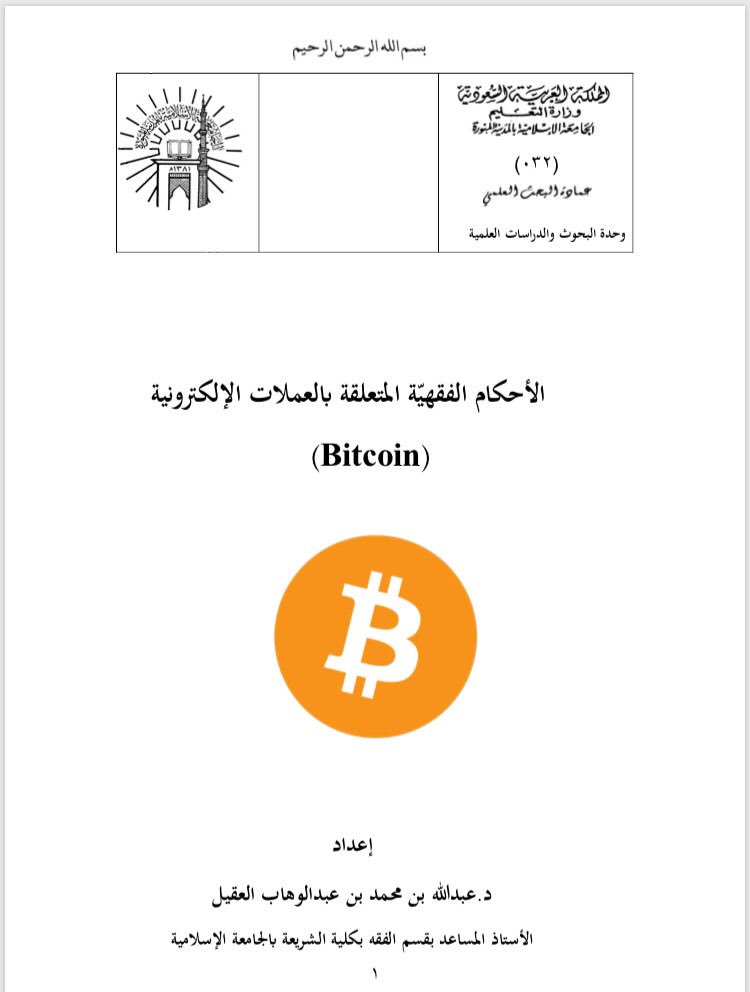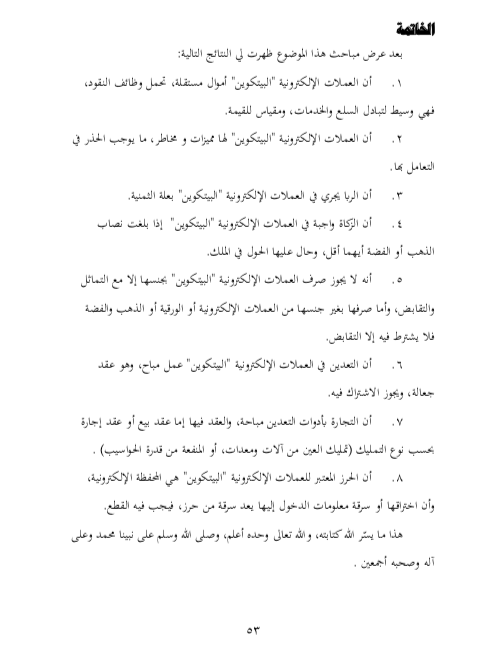Research paper on rulings related to Bitcoin by Sheikh Abdullah Al-Aqeel from the Faculty of Shariah (Islamic University of Madinah). He was the teacher of one of my teachers.
here’s the link to the PDF https://www.noor-book.com/%D9%83%D8%AA%D8%A7%D8%A8-%D8%A7%D9%84%D8%A3%D8%AD%D9%83%D8%A7%D9%85-%D8%A7%D9%84%D9%81%D9%82%D9%87%D9%8A%D9%91%D8%A9-%D8%A7%D9%84%D9%85%D8%AA%D8%B9%D9%84%D9%82%D8%A9-%D8%A8%D8%A7%D9%84%D8%B9%D9%85%D9%84%D8%A7%D8%AA-%D8%A7%D9%84%D8%A5%D9%84%D9%83%D8%AA%D8%B1%D9%88%D9%86%D9%8A%D8%A9-bitcoin-pdf">https://www.noor-book.com/%D9%83%D8...
Here are the 8 points that the sheikh listed at the end of the book that summarize his entire research. I will translate each point & add some extra commentary inshaAllah.
The sheikh says: After presenting the issues related to this topic, I& #39;ve come to the following conclusions:
The sheikh says: After presenting the issues related to this topic, I& #39;ve come to the following conclusions:
Point 1: Cryptocurrencies such as "Bitcoin" are an independent type of capital that carry the functions of money, hence they are mediums for the exchange of goods and services & are a measure of value.
My commentary: The sheikh throughout his research doesn& #39;t clearly give a ruling on the nature of Bitcoin as the main point of his work are the rulings related to Bitcoin, not its nature. However, he implies that Bitcoin is permissible as it is a recognized form of trade.
Point 2: Cryptocurrencies such as "Bitcoin" have specific features & risks that require warning against if used.
My commentary: here the sheikh explores the prohibited aspects related to Bitcoin, such as criminal purchases (drugs, weapons etc), hacking, the deep web & others...
My commentary: here the sheikh explores the prohibited aspects related to Bitcoin, such as criminal purchases (drugs, weapons etc), hacking, the deep web & others...
Point 3: Interest/Usury takes place within cryptocurrencies. The legal cause (علة) for this is price/medium of exchange.
My commentary: sheikh discusses the difference of opinion of the early scholars on whether usury can take place on other than "the 6 items"(gold, silver...
My commentary: sheikh discusses the difference of opinion of the early scholars on whether usury can take place on other than "the 6 items"(gold, silver...
...dates, wheat, salt, barley) mentioned by the Prophet ﷺ in the famous hadith of Ubadah. The scholars differed on the legal cause for singling out these items. The sheikh adopts the position of Ibn Taymiyyah that the legal cause of interest is price/medium of exchange.
Since Bitcoin is a currency in circulation & is accepted by people and, according to the sheikh, fulfills the functions of being a price/medium of exchange, then interest can take place via Bitcoin. Hence Bitcoin is the same as paper money on the issue of interest.
Point 4: It is obligatory to pay Zakat on possession of cryptocurrencies such as Bitcoin, on condition that it reaches the nisaab (minimum threshold) of either gold or silver, whichever one is the lowest & (on condition) that one year passes since it reaches the nisaab.
My commentary: Since the sheikh considers Bitcoin as wealth, then the legal conclusion is that zakat must be paid on it. It is believed that at the time of the Sahabah, the value of gold & silver were in balance, but as time went by, society tended to choose gold as a standard...
..rather than silver, which caused the value of silver to decline creating a value gap between the two. Hence the contemporary scholars hold different opinions in deciding the reference for the nisaab of zakat from wealth; whether it should follow the threshold of gold or silver.
The sheikh discusses this difference of opinion & adopts the position of the majority: that one should take the lower of the two thresholds. This opinion emphasizes benefit for the poor: following the lower threshold is more beneficial for those who have a right to receive zakat.
Point 5: It is not allowed to exchange cryptocurrencies like Bitcoin with its own type, except that it should be equal (tamathul) & there is a handover (taqabud). As for exchange with another crypto, or paper money, or gold & silver, then the only condition is the handover.
My commentary: Just like with cash, this is in order to avoid interest. So you can& #39;t exchange 1 BC for 2 BC just like you can& #39;t exchange 10 USD for 15 USD. However, you can if the currency is different. The sheikh mentions that for BC the handover is technical not physical.
Sh b. Baz: If currency is different then it is permissible for the amounts exchanged to be different, so long as there is a handover. If of the same kind, such as USD for USD, or dinars for dinars, then there must be handover & amount should be the same. Majmu Fatawa (19/171-174)
Point 6: Mining in cryptocurrencies like Bitcoin (known as crypto-mining) is a permissible process. It is a Ja& #39;ala (price offer) contract & sharing/partnership in it is permissible.
My commentary: Look up cryptomining, I& #39;m not qualified to explain it, point is for sheikh its OK.
My commentary: Look up cryptomining, I& #39;m not qualified to explain it, point is for sheikh its OK.
Point 7: Business with cryptomining tools is permissible & its contract is either a sales contract or a leasing contract depending on the type of ownership (ownership of machines/equipment or benefit from computer capacity).
My commentary: Again, I& #39;m not your guy for this subject
My commentary: Again, I& #39;m not your guy for this subject
Point 8: The safekeeping of cryptocurrencies like Bitcoin is considered to be the "digital wallet". Hacking into it or stealing the info to enter it is considered theft (shariah wise) from safekeeping & its legal punishment is amputation.
My commentary: In the Shariah the penalty of amputation for stealing can be inflicted legally only if the object stolen is taken from a place of safekeeping (hirz). For cryptocurrency, this place is considered to be the persons digital wallet.
The sheikh ends with a Dua.
The sheikh ends with a Dua.

 Read on Twitter
Read on Twitter



